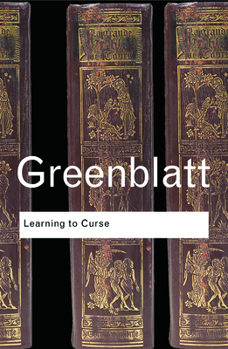Learning to Curse: Essays in Early Modern Culture
Select Format
Select Condition 
Book Overview
Stephen Greenblatt argued in these celebrated essays that the art of the Renaissance could only be understood in the context of the society from which it sprang. His approach - 'New Historicism' - drew from history, anthropology, Marxist theory, post-structuralism, and psychoanalysis and in the process, blew apart the academic boundaries insulating literature from the world around it. Learning to Curse charts the evolution of that approach...
Format:Paperback
Language:English
ISBN:0415771609
ISBN13:9780415771603
Release Date:February 2007
Publisher:Routledge
Length:276 Pages
Weight:0.65 lbs.
Dimensions:0.8" x 5.5" x 7.7"
Customer Reviews
1 rating
A new view of art.....
Published by Thriftbooks.com User , 24 years ago
In LEARNING TO CURSE, Stephen Greenblatt presents a collection of his essays on the works of Shakespeare, Spencer and other authors of the 16th century. The book takes it's title from his first essay, an examination of "The Tempest" by Shakespeare. Greenblatt asks if one can understand a work of art without reference to the artist, his audience, and the social context of period within which the artist worked. He also asks if different audiences in different periods have had similar reactions to the work or even if different people in the same audience in the same period have had the the same reaction. Does a work of art have an intrinsic value that transcends the individual experience over time? On the other hand, Greenblatt says that while the historical context within which the work of art was created is important, it is critical the scholar realize history is not fixed. Using ideas gleaned from the "new historicism" as well as ethnographic and sociological notions, Greenblatt provokes the reader to rethink the idea of 'historical context'. He says his critical approach has been concerned with recovering "as far as possible the historical circumstances" of aesthetic production without viewing history "as a stable prefabricated background against which literary texts can be placed." Instead, he sees the historical context as a "dense network of evolving and often contradictory social forces." The essays in this little volume investigate and interpret a series of literary works by authors from Shakespeare to Martin Luther and Thomas Moore. Greenblatt has included a interesting essay on the case of Martin Guerre in 14th Century France in which he explores the ideas of crime and capital punishment in association with the theft of personal identity in the Middle Ages.





